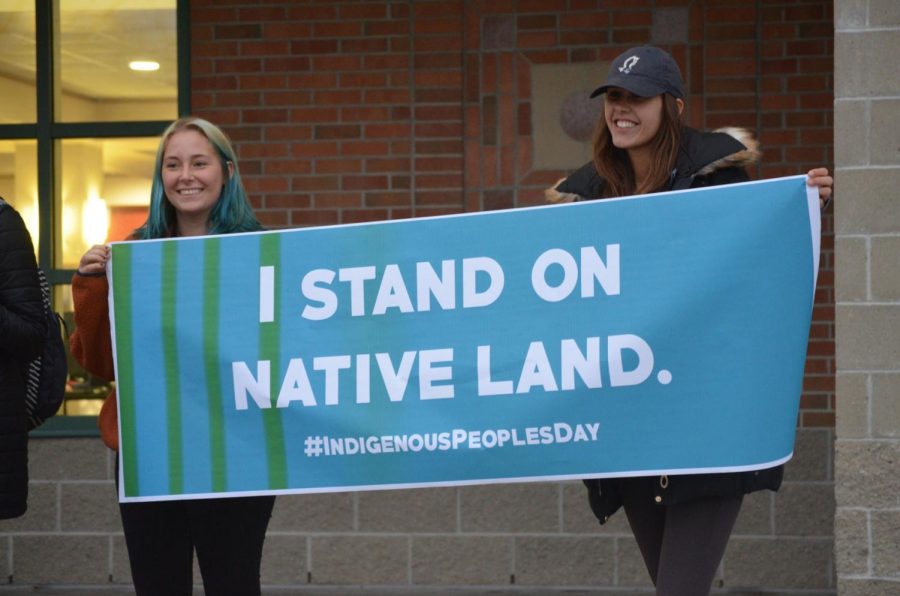Continued calls for Indigenous People’s Day stir discussion
The future of Indigenous People’s Day remains uncertain as students call for Administration and the Board of Trustees to remove Columbus Day from the academic calendar in favor of this proposed holiday.
Various states, cities, and universities around the country have already replaced Columbus Day with Indigenous People’s Day, with proponents of Indigenous People’s Day arguing that Columbus had disastrous effects on the Native American population and should not be celebrated.
The shift to Indigenous People’s Day has been criticized by some members of the Italian American community, who contend that Columbus Day is an important holiday that celebrates their heritage. This sentiment has also been expressed by certain members of the RWU Board of Trustees, leading to debate among the campus community.
At Roger Williams, many students have voiced their support for Indigenous People’s Day; on Thursday, Nov. 30, students organized a peaceful protest in opposition to keeping Columbus Day on the academic calendar. The protest was planned to overlap with a lecture from Carol Delaney, a visiting Columbus scholar.
RWU President Donald Farish complimented students for their handling of the situation.
“I think from the standpoint of how the students represented themselves, they hit exactly the right note,” Farish said. “It was important for them and for this issue to be represented to the [Board of Trustees] as one of serious concern.”
At the moment, it is not clear whether the Board of Trustees or Administration has the power to decide the fates of Indigenous People’s Day and Columbus Day.
While bylaws are in place to delegate certain responsibilities to either the Board of Trustees or Administration, Columbus Day and Indigenous People’s Day do not fall clearly under either body, according to Farish.
Administration and Faculty Union currently have joint power over the academic calendar, in accordance with a bargaining agreement, leading Farish to state that he “would normally argue that the setting of a designation in the calendar would be something that the president would do.”
However, he continued, the Board of Trustees is “the ultimate authority in governance of the university,” and could possibly decide to make the decision themselves.
At the next Board of Trustees meeting, which will be held on March 2, 2018, Farish anticipates a discussion, possibly followed by a vote, regarding who will ultimately hold this decision-making power.
Of the Board of Trustees’ 26 members, two — Mario Gabelli and Arlene Violet — have expressed strong opposition to removing Columbus Day from the university calendar. The remaining 24 Board members, Farish said, have largely remained neutral thus far.
While Columbus Day remained on the academic calendar this year, Farish announced that a four-day “Indigenous People’s Week” would also be celebrated. This compromise, however, did not quell debate.
At a Monday, Dec. 4 Student Senate meeting, most senators expressed that they were not in favor of compromising on Indigenous People’s Day.
In a straw poll, four students at the meeting voted in favor of compromising, nine voted against, and three abstained from voting.
Opposing a compromise, freshman Senator Elsa Schloemer expressed that Columbus Day and Indigenous People’s Day are contradictory of each other and should not coexist on the academic calendar.
The overall conversation progressed to include concerns that student opinion is being disregarded in favor of appeasing the Board of Trustees.
Senior Dorothy Wilkinson, who was in the audience as the president and representative of Inter-Residence Hall Association, said that it would be “absurd” for Senate to have to compromise any longer, noting, “[Senate has] already been compromising for years.”
Student Senate supported an initiative urging the university to consider changing Columbus Day to Indigenous People’s Day in spring of 2015. However, the topic had been discussed in years prior to this time, the then-president of Student Senate told The Hawks’ Herald in April 2015.
Farish acknowledged student concerns that the presence of Columbus Day disrespects the suffering that Native Americans endured at the hands of European colonizers, calling the potential change to Indigenous People’s Day “a place to start” in recognizing this dark aspect of American history.
“To me, whether Columbus was a good guy or a bad guy, he still is the symbolic head of the beginning of the vanguard of the things that followed along and changed everything about the lives of Native Americans, and for that reason, from their standpoint, is not worthy of celebration,” Farish said.
However, Farish added that he hopes to “minimize” the negative effects that the final decision, whatever it may be, would have on the Italian American community, also stating, “The challenge is that the Italian Americans invented Columbus Day a hundred years ago as a way of celebrating the work that Italians have done for the betterment of this country, because at the time they were heavily discriminated against… and they identified with Columbus.”
Before any decision is made, Farish hopes to ensure that students will have the opportunity to share their views with the Board of Trustees, either “through an open forum on campus to which the trustees are invited, or through a process where students are given time at the board meeting itself to present their case.”





